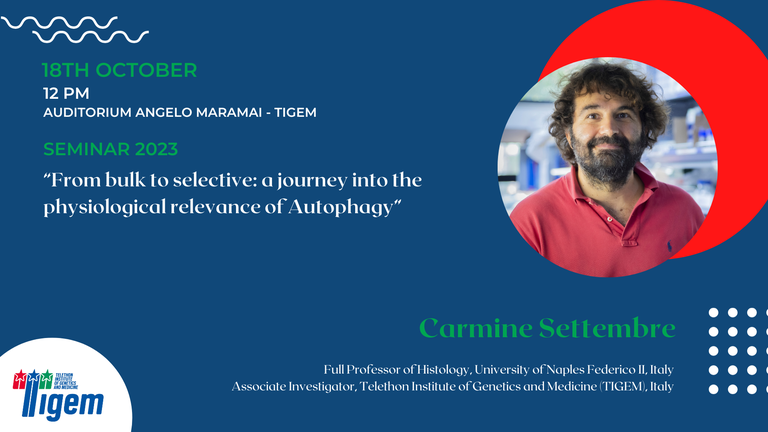Carmine Settembre - "From bulk to selective: a journey into the physiological relevance of Autophagy"
- When Oct 18, 2023 from 12:00 PM to 01:15 PM (Europe/Berlin / UTC200)
- Where Auditorium Angelo Maramai
- Contact Name Carmine Settembre
- Contact Phone 08119230659
-
Add event to calendar
iCal

- https://www.tigem.it/newsroom/seminars/carmine-settembre-from-bulk-to-selective-a-journey-into-the-physiological-relevance-of-autophagy
- Carmine Settembre - "From bulk to selective: a journey into the physiological relevance of Autophagy"
- 2023-10-18T12:00:00+02:00
- 2023-10-18T13:15:00+02:00
Carmine Settembre
Full Professor of Histology, University of Naples Federico II, Italy
Associate Investigator, Telethon Institute of Genetics and Medicine (TIGEM), Italy
Short CV
Abstract
The endoplasmic reticulum (ER) is the largest mammalian intramembranous organelle. Engaged in multiple core functions, it executes structural, biosynthetic and signaling roles. Hence, it is not surprising that ER dysfunction is associated with the pathogenesis of several human diseases, ranging from rare genetic disorders to metabolic syndromes and cancer. Therefore, the identification of mechanisms controlling ER function could potentially shed light on the biological processes underpinning cellular health. Very recently, the regulation of ER size was shown to be controlled by a selective receptor-mediated form of macro-autophagy, known as ER-phagy. During ER-phagy, ER fragments are sequestered into double membrane autophagosomes and subsequently degraded by lysosomes upon autophagosome-lysosome fusion. My laboratory has demonstrated that ER-phagy exerts ER quality control functions by degrading excess/misfolded proteins that accumulate in the ER lumen. Notably, misfolded collagen molecules, which lead to Osteogenesis imperfecta (OI) and Ehlers Danlos syndrome (EDS), are degraded by ER-phagy. We have discovered molecular mechanisms and signaling pathways that control ER-phagy in response to diverse metabolic, developmental, and disease-evoked responses, and by combining bioinformatic analysis with high content screening approaches we have identified novel pharmacological inducers of ER-phagy. Proof-of-concept experiments using OI and EDS animal models and patient primary cells demonstrate that pharmacological modulation of ER-phagy represents a potential novel therapeutic approach to counteract cellular dysfunction in diseases characterized by ER-dysfunction.
